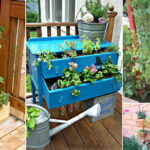In recent years, the popularity of gardening has burgeoned across diverse demographics, establishing itself as a cherished pastime that transcends mere hobby status. A profound connection to nature is intricately woven into the fabric of human experience, and this connection is privileged through the act of cultivating plants. The multifaceted benefits of gardening extend far beyond aesthetic appeal, embedding themselves deeply into mental, physical, and social well-being.
The historical significance of agriculture and plant cultivation cannot be overstated; they have been pivotal in shaping civilizations. From the earliest agrarian societies, the cultivation of plants has provided sustenance, fostering a sense of community and shared responsibility. Today, gardening continues to cultivate not only crops but also joy, tranquility, and a reconnection to the earth.
Even within the chaotic tempo of modern life, the act of nurturing plants brings serenity, offering a sanctuary for reflection and mindfulness. Yet, why exactly is gardening so enjoyable? To elucidate this pleasure, we shall explore its therapeutic qualities, the sense of accomplishment it fosters, and its ability to forge connections with others.
Therapeutic Qualities of Gardening
Gardening possesses remarkable therapeutic qualities that have garnered attention from psychologists and health practitioners alike. The act of tending to plants can reduce stress and anxiety, a phenomenon often attributed to the soothing nature of engaging with soil and greenery. Gardening has been shown to lower cortisol levels, the hormone primarily associated with stress response. The tactile experience of digging, planting, and weeding promotes mindfulness, allowing gardeners to immerse themselves in the present moment.
In addition to psychological benefits, gardening has physical implications that enhance well-being. The immersive physical activity involved in gardening facilitates cardiovascular health, improves muscle strength, and enhances flexibility. Regular engagement in gardening is akin to moderate exercise, as it involves a variety of movements that can boost overall fitness levels. As a result, both mental and physical dimensions of health are enriched through gardening, creating a unique nexus of wellness.
The sense of accomplishment inherent in plant growth serves as a substantial contributing factor to the enjoyment of gardening. Nurturing a seed and witnessing its transformation into a flourishing plant fosters a profound sense of achievement. This process embodies patience and dedication, culminating in a tangible reward. Observing the life cycle of plants from germination to harvest cultivates a sense of stewardship for the environment, instilling an awareness of ecological interdependence.
Furthermore, as one witnesses their efforts manifest into reality—whether through a vibrant flower or a bountiful vegetable harvest—an intrinsic satisfaction arises. This satisfaction can lead to heightened self-esteem and confidence, particularly in those who may struggle with other aspects of life. The garden becomes a canvas for creativity, where experimentation and exploration can thrive without fear of failure.
Fostering Connections Through Gardening
Gardening extends its benefits beyond the individual, fostering social connections and community engagement. Community gardens have gained traction as powerful communal spaces that bring people together, transcending cultural and generational divides. These gardens serve as conduits for collaboration, teamwork, and shared stewardship, enabling participants to cultivate not only plants but also relationships.
Engaging in gardening activities with family and friends creates a platform for shared experiences and bonding. Gardening can be intergenerational, with children learning the joy of cultivation from their elders, thus perpetuating a legacy of environmental appreciation and duty. This communal aspect of gardening can often be filled with joyful laughter, storytelling, and the sharing of knowledge, nurturing a sense of belonging.
Moreover, the act of sharing harvests cultivates generosity. Whether it is sharing fresh produce with neighbors or swapping cuttings and seeds, these exchanges foster a sense of community interdependence. Gardening invariably acts as a catalyst for connections that transcend the boundaries of individual lives, linking people through shared experiences tied to the natural world.
The Inclusivity of Gardening
Another compelling facet of gardening is its inherent inclusivity. Individuals of differing backgrounds, abilities, and ages can partake in this enriching experience. Gardening is adaptable; raised beds, container gardens, and vertical gardening solutions have made this pursuit accessible to those with limited mobility or space. It invites participation from various demographics, creating an egalitarian atmosphere where everyone can contribute and derive joy.
Innovative gardening movements have emerged, focusing on sustainable and organic practices that empower individuals to cultivate their food sustainably. This fosters both environmental responsibility and food security, reminding us of our role in the larger ecological tapestry. When people engage in sustainable gardening practices, they not only reconnect with nature but also bolster their understanding of food systems which is especially crucial in today’s context of climate change and global food challenges.
Promoting Environmental Stewardship
The act of gardening also engenders environmental stewardship. By nurturing plants, individuals develop a profound respect for the planet, embracing the responsibilities that come with it. The knowledge acquired through gardening—seed saving, composting, and pest management—fosters an ecological consciousness that encourages responsible environmental practices. As gardeners observe the cycles of nature, they become advocates for biodiversity, conservation, and sustainability, understanding the importance of protecting native flora and fauna.
Equipped with knowledge and an intrinsic appreciation for the environment, gardeners can significantly influence their communities by promoting ecological sustainability. Initiatives such as planting pollinator gardens enhance local ecosystems, providing essential habitats for bees, butterflies, and other beneficial insects. Establishing such gardens highlights gardening’s role as an impetus for broader environmental movements that underscore the importance of preserving biodiversity.
Concluding Thoughts on the Joys of Gardening
Ultimately, the joys of gardening extend far beyond its superficial aesthetic advantages. The manifold benefits—including therapeutic effects, a profound sense of accomplishment, and fostering connections—underscore its significance in our lives. As individuals cultivate plants, they simultaneously cultivate their own well-being, thriving amidst the challenges of daily existence.
In this age of digital distractions and frenetic lifestyles, gardening invites a return to simplicity, allowing individuals to reconnect with the earth, each other, and themselves. As we dig our hands into the soil, nurture our gardens, and witness the splendid relationships that bloom from these endeavors, we unlock not only the joy of growing plants but also the deeper understanding of our place within the intricate web of life.









Leave a Comment